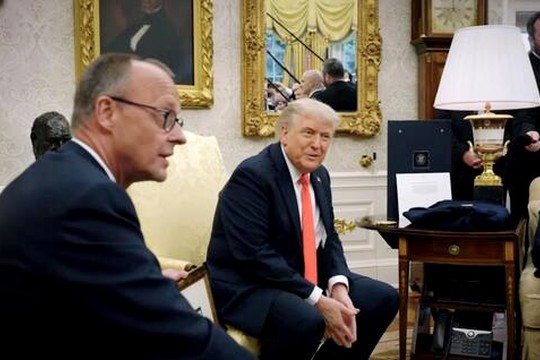President Donald Trump met with German Chancellor Friedrich Merz in the Oval Office for the first time since Merz’s election last month.
Photo: ‘The Center Square’
The German chancellor had come to Washington hoping to persuade President Trump to play a more active role in defending Ukraine. Mr. Trump made no commitments, notes ‘The New York Times’.
German Chancellor Friedrich Merz had one main ask of President Trump during his Oval Office visit on Thursday: that the American president stand with Europe in pressuring Moscow to back down from attacks on Ukraine and push to end the three-year war.
To which Mr. Trump replied: “Maybe they need to fight a little longer.”
“Sometimes you see two young children fighting like crazy,” Mr. Trump told reporters in the Oval Office as Mr. Merz looked on, stone faced. “They hate each other, and they’re fighting in a park, and you try and pull them apart. They don’t want to be pulled. Sometimes you’re better off letting them fight for a while and then pulling them apart.”
It was the latest pivot by Mr. Trump away from the conflict that he once said confidently that he would end.
On Thursday, however, he compared the Russia-Ukraine war to a hockey game, where referees sometimes allow players to drop gloves and brawl on the ice — an observation he said he had also made earlier in the week in a private phone call with President Vladimir V. Putin of Russia. “I gave that analogy to Putin yesterday,” he added. “I said, ‘President, maybe you’re going to have to keep fighting and suffering a lot, because both sides are suffering, before you pull them apart, before they’re able to be pulled apart.’”
Mr. Trump’s posture comes at a moment that German officials say could be decisive for Ukraine’s chances of forging peace on favorable terms. Mr. Merz had come to Washington hoping to persuade Mr. Trump to play a more active role in defending Ukraine, bringing unrivaled U.S. power to the task of forcing Russia to end its invasion of its smaller neighbor.
But Mr. Trump made no promises of such pressure, and he made no concrete commitments to provide weapons or back sanctions, either publicly or privately with Mr. Merz. The closest he came was in response to a question about if and when he might favor new financial penalties on Russia, as European leaders, including Mr. Merz, have proposed. Mr. Trump said he had a deadline “in my brain” for when he might favor such a move.
He also suggested that Ukraine might come in for financial punishment. “We’ll be very, very, very tough, and it could be on both countries, to be honest,” Mr. Trump said. “You know, it takes two to tango.”
Aides say that Mr. Trump is exasperated with both presidents in the conflict, but often more so with Ukrainian Zelensky. Mr. Trump has told his advisers that Mr. Zelensky is a “bad guy” who is edging the world to the precipice of nuclear war. But Mr. Trump has also told aides that it is understandable that Mr. Zelensky is fighting back, given he is in a war against an enemy that seems determined to keep bombing Ukrainian cities.
With Mr. Putin, the president seems more disappointed than angry. He had seemed to genuinely believe that his personal relationship with the Russian leader would bring a swift end to the war, advisers say. But Mr. Trump has learned the limits of American leverage with Russia when he is reluctant to send Ukraine more money or weapons.
Superficially, at least, the Oval Office appearance went better for Mr. Merz than he and his advisers privately had expected. There were none of the blowups that have characterized some of Mr. Trump’s other meetings with foreign leaders. The two men had a warm rapport and exchanged compliments.
Mr. Merz had rehearsed for the trip, and his aides sought advice from other foreign officials who have recently visited the White House. They were determined to avoid the sort of public dressing-down that Mr. Trump had given Mr. Zelensky and President Cyril Ramaphosa of South Africa in recent months.
The Germans were elated with the results. Mr. Merz’s phone lit up with congratulations from fellow European leaders. He told reporters after the meeting that he and Mr. Trump “get along well on a personal level.”
Mr. Trump made no commitments. Instead, he boasted about the U.S. economy and military recruitment numbers under his leadership.
…German magazine ‘Focus’ calculated that Merz himself spoke for only 3 minutes and 50 seconds out of 40 minutes of communication during the meeting with Trump. That's all you need to know about the meeting.
read more in our Telegram-channel https://t.me/The_International_Affairs

 10:47 07.06.2025 •
10:47 07.06.2025 •























